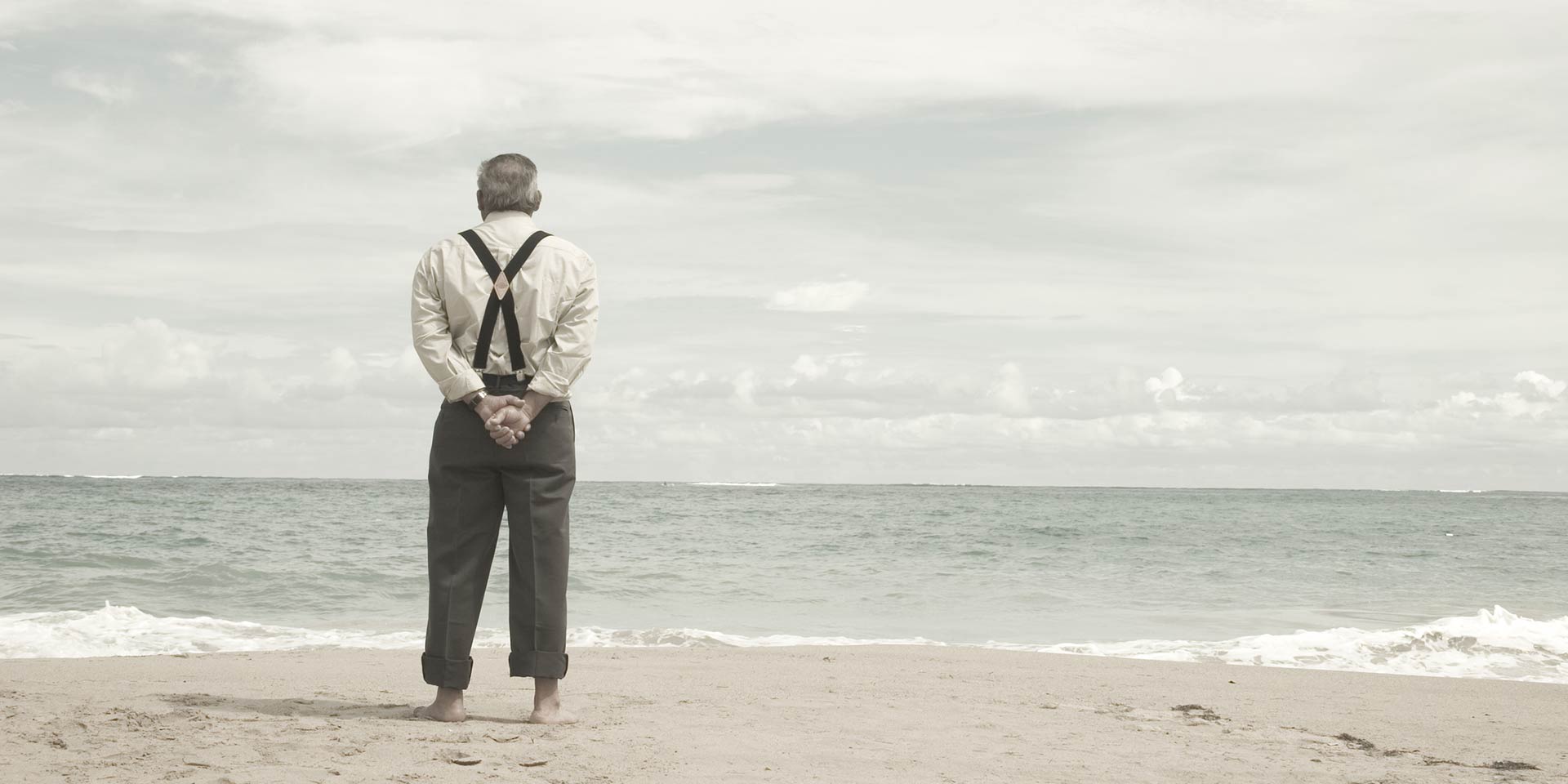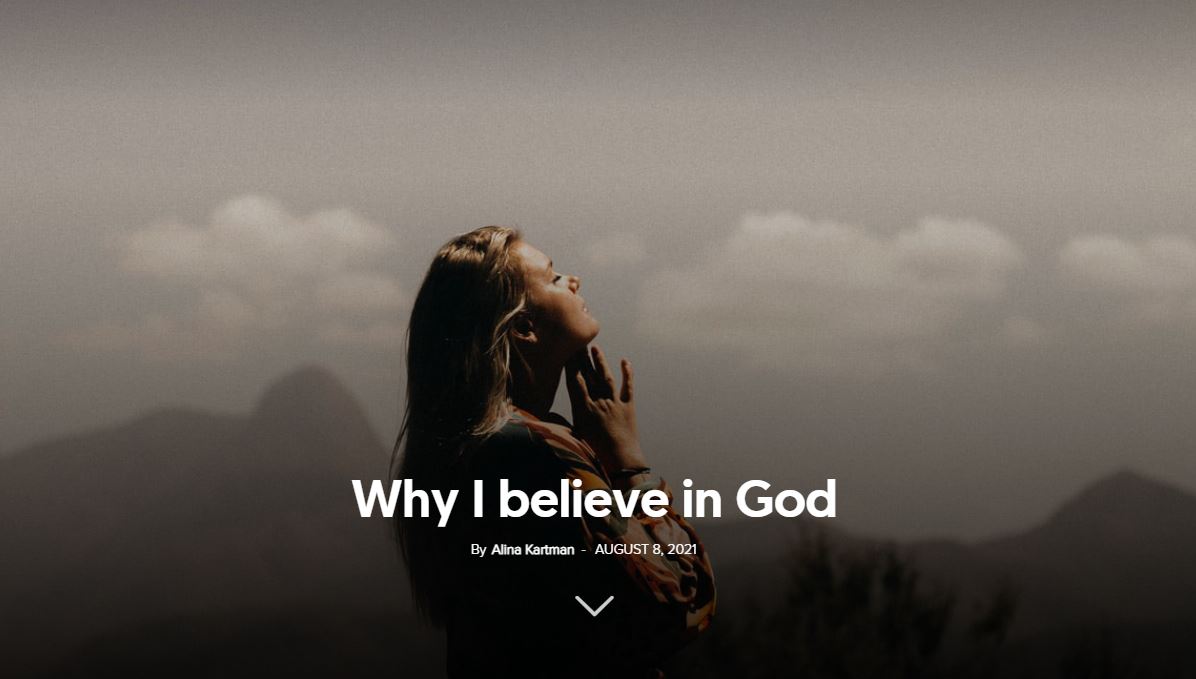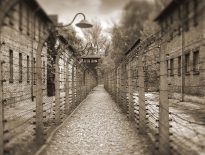“Who were the two artists of ancient times who competed to see who could paint the visible world most faithfully? ‘Now I shall prove to you that I am the best,’ said the first, showing the other a curtain which he had painted. ‘Well, draw back the curtain,’ said the adversary, ‘and let us see the picture.’ ‘The curtain is the picture,’ replied the first with a laugh.” (Nikos Kazantzakis)
Whether Christians like it or not, their lives are a system of communicating vessels in which elements of a double reality meet at different densities: the one here and the one beyond; the visible that besieges their senses and the invisible that sends sporadic echoes through the thick curtain that separates them. In this effort to become both a citizen of the present world and the world to come, one encounters the sceptical attitude of those who believe that the present reality, which is so overwhelming, is too vividly painted to be merely a separating curtain; what they see in it is the picture itself and nothing beyond its more or less familiar dimensions.
Having lived for so long between the boundaries of the seen world, however, even Christians have found ways of settling more comfortably within them, gradually shifting their focus from eternity to the here and now. This is neither a renunciation of the Kingdom nor a denial of its reality, but rather a focus that oscillates between the two registers in favour of the more familiar one.
Yet the world beyond, although unfamiliar, sometimes meets the world here, however tarnished by the touch of sin. Philip Yancey mentions some of the occasions on which it seemed to him that the material and the spiritual merged, testifying to the existence of a meticulous designer: the vastness of the ocean, a giant turtle laying its eggs, the hovering of hummingbirds, or the agility of Abert’s squirrels.[1] John Ortberg mentions other rare points of encounter between the two worlds: the birth of a child, the interlacing of words in an ancient hymn, a sunrise, or the sunset of a life.[2]
There is an even clearer image of the way in which the spiritual is woven into the fabric of the material world: the image of the human being who has broken free from the turmoil and uncertainty of the everyday rollercoaster to step onto firmer ground, or who becomes stronger with every step of faith. Beyond the comfort of appearances, this kind of faith can gain a monopoly on life, Dietrich Bonhoeffer assures us, by capturing the flow of each day’s worries and silencing them before the One who created everything, including the day.[3]
Christians can live simultaneously in “the small, earthly time of the daily cadence” and in “the great, heavenly time of the arc between the beginning and the end”[4] only if they escape the anonymity of those who live on bread and water by deciphering the meaning of perseverance through the power of every word “that comes from the mouth of God.”[5]
Living by faith
“By the grace of God, I would rather go through the greatest hardship than make supplication to anyone but the living God. For I do not wish in the least to detract from the testimony that I wish to bear to the end, namely, that it is enough to trust in the living God” (George Muller).
The story of George Muller, the man who cared for 10,000 children without having any material resources and without asking for help from anyone, introduces us to the setting of a life rooted—beyond the declarative register—in the core of a robust trust that God is all we need. His six decades of dedication to a monumental project are an example of a faith that takes on substance with each step into the unknown.
There was nothing to suggest that young George would be a future champion of the faith; his childhood hobbies included playing cards, getting drunk, and stealing his parents’ money; he even ended up behind bars at the age of 16[6] and his life as a theology student, as he recounts with disarming honesty, was lawless and out of control.[7]
The fact that God had the power to change his life would be the source of his astonishing confidence that he could count on Him to meet any need—especially when those needs belong to the most helpless category of human beings: orphans.
From “modest” beginnings (30 orphans housed in a rented building, a number that tripled within a year), the project grew beyond the expectations of its initiator: five orphanages with a total capacity of 2,050 children, a real neighbourhood. Even from a distance, this settlement was a miracle in itself, built within reach of those unaccustomed to looking at life other than through the lens of reason. The 1,700 windows that were lit every night were another reason for confidence, as confirmed in one of the many letters received by the orphanage’s founder. The whole project rested on a solid foundation: Muller’s faith, which, the more severely it was tested, the fresher and more lively it became.
Muller’s notes shed light on the enormous task that rested on his shoulders: feeding 2,000 children every day was a daunting task in itself. But the list of needs to be met went far beyond daily feeding: 6,000 pairs of shoes a year, the cost of maintaining the five buildings with a total of 500 rooms, medical treatment for the children, salaries for the staff (teachers, medical staff, cooks, and numerous helpers), contingencies, travel, and the expenses of children leaving the orphanage—for each apprentice sent to learn a trade, the craftsman was paid £330.
At the end of these calculations, Muller did not forget to add a postscript in which he expressed his absolute confidence that he was merely an administrator, relieved by the “Father of the Orphans” Himself of the burdens that might have crushed him.[8] Mentioning that he had no means of his own to cover this amount of expenditure, the confident steward concluded this account with a declaration of faith: “And yet it must be said that all things are easily done, for in all these things we look to Him who is rich beyond measure.”[9]
When the crisis sets in over the course of years
“We may be poor, even very poor; sometimes we may pray a hundred times before God’s answer comes to us; we may be forced to rely on His help from one lunch to the next. From the way things look on the outside, one might think that He has forgotten us; but as certain and real as it is that we have a real need, it is equally certain that God will answer us, in His time and in His way” (George Muller).
Muller’s work has two great periods of crisis: 1838-1844 and 1870-1874.
A crisis that lasts for several years can easily erode confidence, but George Muller was built differently. Troubled by the real needs he faced, he remained anchored in an invisible reality, confident that the Father of orphans would fill any gaps, not according to a human timetable, but in “His time.” His diary is based on two realities that were not allowed to diverge, however intimidating the immediate context may become.
On 18 August 1838, Muller wrote: “Morning. I have not a penny in the house for the orphans… My eyes are turned to the Lord.”[10] This was to become the theme of all his notes. Aware of the magnitude of the needs to be met, he systematically chose to focus on the fact that God had kept His promises. In fact, according to his testimony, Muller drew from the Scriptures a plethora of arguments (which he then presented in prayer) that strengthened his faith that he would receive help. The first of these was that the purpose of this project was precisely to show that God is alive and responding in modern times, just as He did in the New and Old Testament. He believed that for God, as the Father of orphans, the only option was to take care of them; indeed, according to the Gospel, it is through them that He himself is fed, clothed, and sheltered.
The possibility of the failure of his welfare project never caused seismic waves in his confidence. When asked what he would do if there was nothing to put on the table at lunchtime, Muller replied that he was convinced that such a hypothesis could not take shape, as he had received the grace to believe in God’s goodness. And his faith was constantly renewed by the fact that, although there might not have been any money for milk the night before, by the time the meal came, all needs, at least the immediate ones, had been met.
The weapons of a traveller into the unknown
Muller’s life was a real expedition into the unknown, full of challenges and risks, so he needed the right tools to help him reach his goal.
First of all, George Muller had learned the art of waiting on God in prayer. He believed that he had to work as if success depended entirely on his efforts, but at the same time to seek God persistently, relying only on His help. In fact, Muller actually rejoiced when the problems he faced were described as impossible, because their subsequent solution would bear the mark of supernatural power, rendering their supposed insurmountability ridiculous. It was also a means of suppressing any attempt to take credit for the longevity of an enterprise that seemed doomed from the start.
One of his prayer habits was to keep a diary in which he detailed the problems of the day and, in another column, the date and manner of their resolution. The best hours of the morning were devoted to prayer and the written Word, and Muller achieved the feat of reading the Bible from cover to cover more than 200 times. The moment of death would come for him in the morning at prayer. Muller ended his journey in the same way that he had conquered the steepest slopes of the impossible: on his knees.
Muller understood that the prayer that opens the windows of heaven does not revolve around demands and goes even beyond the threshold of gratitude; it involves handing over control of all possessions and desires to the One who cannot waste them: “Only those who have shown themselves willing to give everything they have over to God have power through prayer.”[11]
In his heart, there was never a lack of unshakable confidence that he was in God’s hands and that His every word had the power to be fulfilled. In fact, in all the 60 years that he ran the orphanages, Muller identifies only one moment of discouragement, which occurred at an early stage of the crisis of 1838-1844.
His subsequent interpretation of the crisis as a test of his faith, rather than the (always losing) idea of God’s abandonment, led to his decision not to allow himself any more moments of doubt.
Kierkegaard believed that the future can be faced and overcome by faith[12] and that the perspective of faith always includes the victory of good over all circumstances, even those that seem shrouded in chaos, injustice or powerlessness. For “all things God works for the good of those who love Him.”[13]
Muller’s faith was woven into every thread of a future without uncertainty, thanks to the One who governs it in every detail. His conviction was that we must not escape from the test through a door we have built for ourselves, but by trusting in the One who has a way out, always in His own time, always through the front door. If our human nature makes us afraid of situations for which we see no solution except in God, it is precisely these circumstances that are the raw material of our spiritual maturation. “The more we are deprived of visible support, the more we will see God’s help.”[14]
It is a vision similar to that of Kierkegaard, who, in defining the conditions of compatibility between humans and God, unveiled the secret of this divine-human relationship, which is possible only by placing humans in a zone of radical dependence: “He who knows in his heart that he is incapable of doing anything has every day the desirable and undeniable opportunity to learn that God is alive.”[15]
A successful experiment
Muller’s desire to found an orphanage was, beyond the humanitarian and Christian reasons for such an undertaking, also an attempt to revive the withered faith of the Christians of his time.
In his experience as a pastor, he had come across various categories of people who were stuck in the tangible and certain world they claimed to inhabit temporarily: Those who feared the deprivations of a future in which physical deterioration would no longer allow them to work; those who were engaged in businesses which they managed with a divided conscience according to the unwritten and dubious principles of earthly success; or those who exhausted themselves, because they were underpaid, by working 14-16 hour days, undermining their health and destroying the chances of a life built on devotion. The biblical argument with which he sought to restore their confidence in God as the true sustainer of their lives was: “But seek first his kingdom and his righteousness, and all these things will be given to you as well.”[16]
The overt reluctance of those with whom he spoke, to take a leap into the unknown without the protection of a safety net, and their refusal to look beyond what they had built with their own hands, drove Muller to oppose superficial faith and led him to embark on a bold mission: to make God visible.
He received donations, sometimes from unknown donors, ranging from two cents to £300,000. No donor ever knew how bankrupt or prosperous the orphanage was at the time of their donation, and contributions were never given as a result of direct or indirect solicitation, for Muller was convinced that to depend on a human donor was to work one’s way to failure. In the same way, total dependence on divine support, he believed, entitles one to a degree of blessing that would otherwise be denied.
The reverberations that George Muller’s death at the age of 93 produced in the press prove that his argument, carried out over an impressive period, validated the premise on which it was built.
The Times recalled the unprecedented results of Muller’s work, the St James Gazette noted the unusual nature of his faith, and the Bristol Evening News noted that the scepticism of those who scoffed at the power of prayer in no way diminished their admiration for Muller’s results. The Daily Telegraph, emphasising the miraculous steps his life had managed to climb, concluded that the world would be much the poorer for his absence.[17]
Surely, two centuries after Muller’s life, we can appreciate the lessons it taught—or example, that there are doors of healing between the visible and invisible worlds, and that they can only be opened by the fervent prayer of faith.
In a paradigm of clarity with which we pretend to analyse detachable pieces of the puzzle of life, his experience showed us that the true clarity of things is revealed when they are seen through God’s eyes.
We could diagnose the independence and sufficiency of modern human beings, with all their crushing anxieties and responsibilities, as the result of the unilateral weakening of a divine-human covenant. This cannot be attributed to our divine counterpart (“Never will I leave you; never will I forsake you”),[18] but rather to our reluctance to place ourselves in the logic of total, uninterrupted surrender: “For as soon as we decide to give ourselves completely to God, He gives himself completely to us” (Thomas Merton).[19]
Muller’s story echoes the desire to learn how to depend on divine help, to bring God back into the realm of the visible and discernible, and—why not?—to reveal the array of miracles He can unfold over a life once it has entered into the cadence of His footsteps.
Carmen Lăiu is an editor at Signs of the Times Romania and ST Network.




















